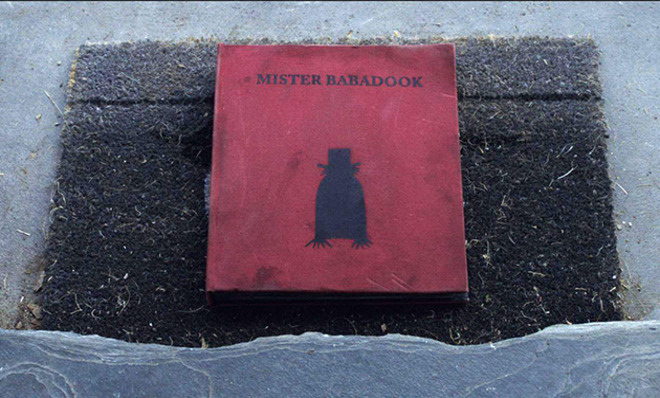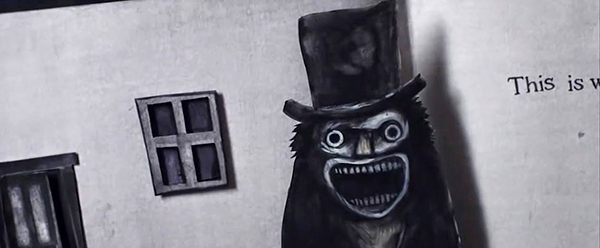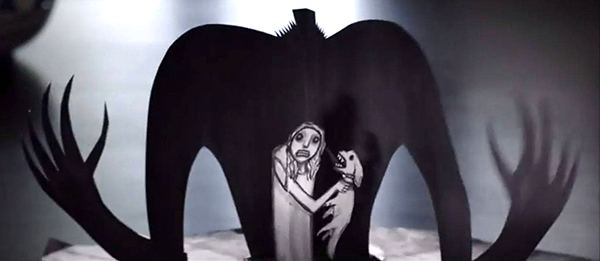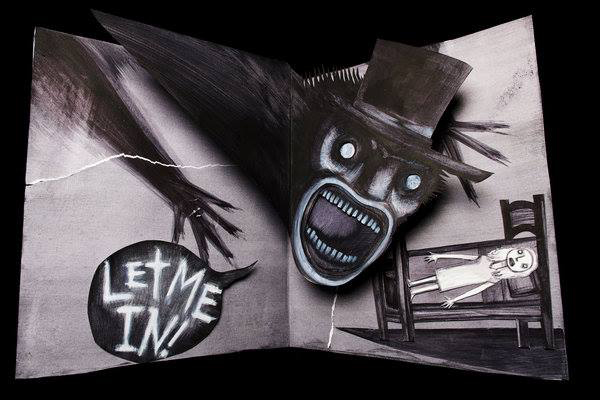Mister Babadook: An oral history of 2014's most terrifying movie prop
The creative team behind the book at the center of the year's best horror movie pull back the curtain on Mister Babadook


A free daily email with the biggest news stories of the day – and the best features from TheWeek.com
You are now subscribed
Your newsletter sign-up was successful
"If it's in a word, or in a look, you can't get rid of the Babadook." That's the prophetic warning — delivered by, of all things, a children's pop-up book — in The Babadook, a low-budget Australian film that towers over every other horror movie released in 2014.
The Babadook follows Amelia (Essie Davis), a grieving widow with an enormously troubled young son (Noah Wiseman). One night, when Noah can't sleep, he asks her to read him a children's book he discovered on his shelf: Mister Babadook, a bizarre pop-up story about a monster who torments a mother and son after he gains access to their house:

Where did Mister Babadook come from? I spoke with Jennifer Kent, the writer and director of The Babadook, and Alex Juhasz, the illustrator responsible for bringing the book to life.
The Week
Escape your echo chamber. Get the facts behind the news, plus analysis from multiple perspectives.

Sign up for The Week's Free Newsletters
From our morning news briefing to a weekly Good News Newsletter, get the best of The Week delivered directly to your inbox.
From our morning news briefing to a weekly Good News Newsletter, get the best of The Week delivered directly to your inbox.
………………………………………………………………………………
Jennifer Kent: I knew somehow this thing — this energy — had to infiltrate the house. I was thinking, what's the best way? And a children's book really made sense. It needed to be something that involved Sam, Amelia's child.
Though she had long settled on a children's pop-up book as the catalyst for the story, Jennifer knew she would need the perfect illustrator to bring her book-within-a-movie to life. She found her ideal choice in Alex Juhasz, an artist whose work included the Emmy-winning title design for Showtime's The United States of Tara.
Jennifer Kent: I went to Alex Juhasz's page and found a couple of illustrations, and they were amazing: strange and beautiful. The obvious huge gift that Alex has. I was referencing him a lot when we were trying to find an illustrator, and I said to my producer, "Why don't we just use him? Why don't we just ask him if he'll come and do it?"
A free daily email with the biggest news stories of the day – and the best features from TheWeek.com
Alex Juhasz: Reading the script, I thought, "This is something special," and I jumped onboard, with the caveat that I wanted to come to Australia to work with her on it. The film hadn't been designed yet, so it was a great opportunity to hash out a lot of the look. It’s a strange thing, in the internet age, to demand — but when you're trying to find something, it's important to be there with somebody.
Once Alex arrived, the duo began a months-long process to bring the book to life.
Jennifer Kent: [When looking for inspiration], I was really fascinated by Edward Gorey, and a couple of others. But the illustrator that really intrigued me was Lotte Reiniger. She's not an illustrator, as such — she was an animator — but she made all of her creations. She cut them out, and she pinned them together. She created Prince Achmed, which is considered to be the first full-length animation ever made.
Alex Juhasz: She gave me a bunch of references: Old silent films, and some really cool, very stark old prints... There was a big sort of discovery period where I was just getting how to sketch it. It's a fun way to work because I would just do a bunch of sketches, sit down with Jen, and she'd say, "Let's work in this direction. This is good." Or, "[The Babadook] needs to have a crazier smile."

Jennifer Kent: I knew the Babadook needed to look, on the outside, like it was something playing at being human. We couldn't see any skin. It's not a real human being in there, it's something else. So there's no face. There are gloves, but there are no hands. There's a mask. His hair looks like a wig. The top hat. Every part of it is pure disguise.
Alex Juhasz: There's two versions of him, basically. There's Mister Babadook, who's the guy in the book. He's got his mask, and he's got his costume on. He's sort of like an interpretation of what the monster thinks…a misguided interpretation of what a man should be. What would be acceptable? "Maybe they'll let me into the house if I've got this poor disguise on"... Jen would say, "I want him to feel like oily hair, and organic shadows, and all the nasty dark bits of repression and childhood fears." It's all, like, squeezed into a little man suit. And once he's revealed, he can open up. Who knows what the real Babadook is?
Jennifer Kent: But it also needed to have a childlike quality that would believably sit in a book that could turn up unexpectedly on anyone's bookshelf. The first time you see him, he can't be so scary that people go, "Oh my God. This is insane! This should never be on a children's bookshelf!" It was a fine line.
Alex Juhasz: We knew right away [when we had it right]. "That's him. That's the guy." He showed up. He manifested himself. The style emerged once we found [Mister Babadook]. Once we found him, I was able to do layouts, and composition, and basically draw up the book page by page.

Jennifer Kent: It was incredible. I knew I had something that was going to be so hugely important in the film. That was it. That was my monster. I was absolutely thrilled when I held that book in my hands.
Alex Juhasz: There were four versions of the book created for the film. Two of them were stunt books that just got thrown around. One of them got burned. The important thing was making the main book just spectacular. It was all handmade. Everything was hand-painted and glued together, and hand-bound.
As The Babadook grew in popularity, demand for a facsimile copy of the book grew louder and louder. A website was created to allow fans to preorder a copy, though the books would only be produced if the preorders hit a minimum threshold. The website allowed for 50 days, but the book preorder hit its minimum threshold in less than a week.
Jennifer Kent: I'm a real purist, and I hate the idea of Babadook Happy Meals or whatever. I didn't want to capitalize on the film that way, because it's not that kind of film. But the book is a work of art... It was always in the back of our minds: we could produce that. We made sure, in the contract before we started filming, that we were in charge of [the book rights]. And it's worked out really well because now we can do what we want with them. We don't own the film, so we can't go and do what we want with the film.
Alex Juhasz: People were really interested in buying the book. And I was like, "Why would you want to bring the Babadook into your house? Did you not watch the movie?" [laughs] It's a funny thing, listening to people on Twitter. "Hey, I want the book." "That's great. Do you know what you're getting into? Please don't read it to your kids, either." But I'm super excited about it. I can't believe the response. It's kind of amazing.

Jennifer Kent: We're going through a huge amount of trouble to make it as much like the book in the film as possible. We want people to have something really beautiful. And we want to freak people out.
Alex Juhasz: The book comes to an abrupt end in the film. We're going to revisit it, so Jen had some ideas about how to make that, from bookend to bookend, work as a story. There will be some additional information; some additional illustrations.
Jennifer Kent: I'm sure a lot of them will get delivered as gifts on people's doorsteps. I really hope so.
The original book that appeared in the film remains in the hands of Jennifer Kent.
Alex Juhasz: There is no copy of the book. I left it all in her care. I think she's very protective of it, and I'm glad.
Jennifer Kent: One fully working, functioning copy. It is like gold. I'm going to have to carry it with me on the plane [to America], and it freaks me out that I have that book in my care. I'm going to need to have a metal briefcase like Mission: Impossible. There's only one copy, and I get it. At the end of all of this, I actually get that book. I'm very, very happy about that. [laughs] I think I've earned it.
Scott Meslow is the entertainment editor for TheWeek.com. He has written about film and television at publications including The Atlantic, POLITICO Magazine, and Vulture.
-
 How the FCC’s ‘equal time’ rule works
How the FCC’s ‘equal time’ rule worksIn the Spotlight The law is at the heart of the Colbert-CBS conflict
-
 What is the endgame in the DHS shutdown?
What is the endgame in the DHS shutdown?Today’s Big Question Democrats want to rein in ICE’s immigration crackdown
-
 ‘Poor time management isn’t just an inconvenience’
‘Poor time management isn’t just an inconvenience’Instant Opinion Opinion, comment and editorials of the day
